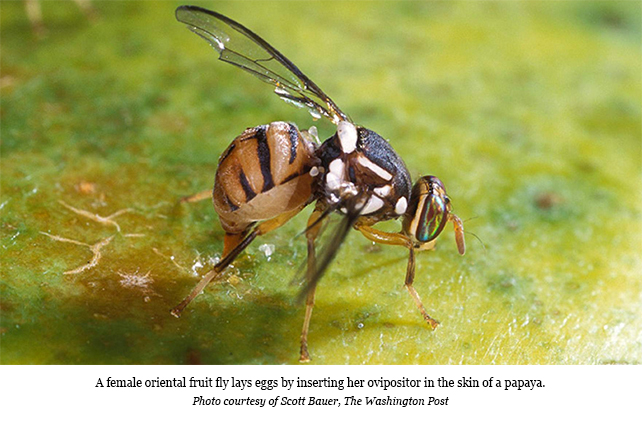by Alahe Izadi, The Bulletin
What’s the biggest enemy to Miami-Dade County’s $1.6 billion agriculture industry? A little fruit fly. Specifically, the Bactrocera dorsalis, or oriental fruit fly.
The flies, described by Florida’s Agriculture Department as one of the industry’s “most devastating pests,” were first spotted in the county Aug. 26. Since then, a total of 159 of the insects have been detected in Miami-Dade County, according to the agency. Most of them have been found in Redland, home to a high concentration of groves.

The fruit fly, firmly established in various Asian countries, is considered especially economically harmful because it infests so many different kinds of plants. Female flies lay eggs in more than 430 varieties of tropical fruits, vegetables and nuts, including avocados, mangoes, bananas and papayas. The larvae feast on the produce.
“If it becomes established in the continental U.S., it will ravage commercial agriculture and make it difficult and expensive for you to grow fruits, nuts and vegetables in your backyard,” reads a fact sheet from the Miami-Dade Oriental Fruit Fly Program.
The infestation is one of Florida’s largest and raises nationwide concern as the area provides produce during winter months.
Florida’s Agriculture Commissioner Adam Putnam declared a state of agricultural emergency earlier this month and an 85-square-mile area was quarantined, meaning growers were restricted from moving fruits and vegetables. Many in Redland had to halt production just as they were harvesting.
“We estimated that we have mamey (a tree species) alone about 500,000 pounds left on the trees,” J&C Tropicals operations manager Salvador Fernandez told NPR. “(As for)dragon fruit, that leaves 20 million pounds on the trees potentially.”
The state agriculture department issued a statement last week, saying that “efforts to eradicate the pest are working.” In addition to the quarantine, workers are applying pest treatments to areas where each fly is found, removing fruits from host trees and setting out traps to find any more flies.
But officials are still weighing whether to start aerially spraying pesticides in South Florida.
Source: The Bulletin
